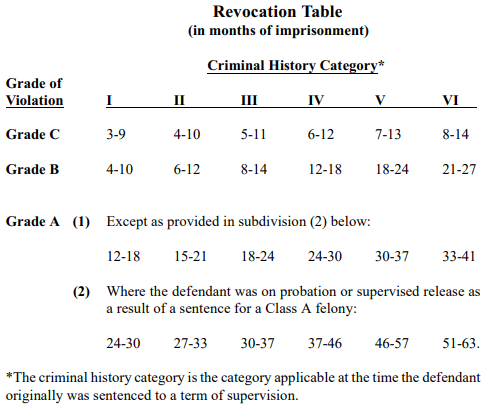Violation of Supervised Release in Federal Court
If you have previously served a federal prison sentence, you will have been placed on supervised release, and you will be required to report to a “probation” officer.

Overly Difficult Terms of Supervised Release Set the Defendant Up for a Violation
If the government or a probation officer supervising an offender believes that the defendant has violated one or more conditions of supervised release, the government or the probation officer is authorized to file a petition to revoke supervised release; an Assistant United States Attorney need not file the petition for the government. The petition serves as the “written notice of the alleged violation” of the defendant’s supervised release conditions. A court may issue a summons or an arrest warrant in response to the petition. Suppose the court fails to issue a summons or warrant before an offender’s term of supervision expires. In that case, the court loses jurisdiction to revoke supervised release (even if the probation officer’s petition to revoke is filed during the supervised release term) (18 U.S.C. § 3583(i); see also United States v. Janvier, 599 F.3d 264 (2d Cir. 2010)). It can be hard to successfully navigate federal revocation and sentencing proceedings without experienced federal defense counsel at your side.
Suppose a summons or warrant is filed before the supervised release term expires. In that case, the accused has the right to a violation hearing to determine if a revocation is warranted. Each United States District Judge has their particular idiosyncrasies concerning these hearings. It is highly recommended that a person accused of a violation of supervised release work with a highly experienced federal defense attorney.
Types of Violations in Federal Court
Grade A Violations
Conduct constituting (A) a federal, state, or local offense punishable by a term of imprisonment exceeding one year that (i) is a crime of violence, (ii) is a controlled substance offense, or (iii) involves possession of a firearm or destructive device of a type described in 26 U.S.C. § 5845(a); or (B) any other federal, state, or local offense punishable by a term of imprisonment exceeding twenty years.
Grade B Violations
Conduct constituting any other federal, state, or local offense punishable by a term of imprisonment exceeding one year.
Grade C Violations
Conduct constituting (A) a federal, state, or local offense punishable by a term of imprisonment of one year or less, or (B) a violation of any other condition of supervision.
Probation and Supervised Release Violation Sentencing
The potential prison sentences for someone found guilty of a federal probation or supervised release violation are as follows:
- Class A felony – up to five (5) years
- Class B felony – Up to three (3) years
- Class C or D felony offenses – Up to two (2) years
- Any other cases – Up to one year
Below are the sentencing guidelines applicable to sentencing for violations:
A Federal Defense Attorney Can Help with a Violation of Supervised Release
The defense attorneys with LEWIS & DICKSTEIN, P.L.L.C., are strong advocates for individuals accused of violating supervised release. We have extensive experience with federal revocation and sentencing proceedings. Based in the Detroit area, we represent individuals across Michigan. The conditions of a person’s supervised release are tailored to the nature of their conviction. Violation of a supervised release can occur in several different ways, such as:
- Not reporting to your probation officer
- Failing a drug test
- Allegations of new criminal activity
- Failing to pay fines or restitution
- Failing to submit monthly reports
Federal Revocation and Sentencing Proceedings
Someone accused of a supervised release violation is entitled to formal federal revocation and sentencing proceedings, and they have rights that must be protected. However, in these hearings, the accused is not entitled to a jury and must rely on a judge to make fair and equitable decisions. If the judge finds by a preponderance of the evidence that the defendant violated their supervised release, the judge can order them to return to federal prison.
Often, a defense lawyer can work and collaborate with the defendant’s probation officer before they appear in court. Proactive representation can be helpful in various ways and provide effective damage control. Experienced federal defense lawyers, such as those with LEWIS & DICKSTEIN, P.L.L.C., will discuss the situation with the probation officer and persuasively demonstrate why their client should not be incarcerated. If someone is charged with a new crime, one of the criminal attorneys with our law firm can defend them on the supervised release violation and the new state or federal charges. We do whatever it takes to protect and defend our client’s rights and achieve a favorable result!

Unparalleled Track Record – Federal Criminal Defense in Michigan
Contact the federal defense attorneys with LEWIS & DICKSTEIN, P.L.L.C., for a free initial consultation. If your probation officer has claimed you violated the conditions of supervised release, contact our law firm immediately. We offer a free initial consultation and flexible fee arrangements depending on the nature of your case. If you have questions regarding federal revocation and sentencing proceedings or any federal or state criminal charge, please call us, and we will take the time to talk with you and answer your questions. Our defense attorney fees are affordable, yet take into account our extensive experience and track record of success.
Call us today at (248) 263-6800 for a free consultation or complete an online Request for Assistance Form. We will contact you promptly and find a way to help you.













